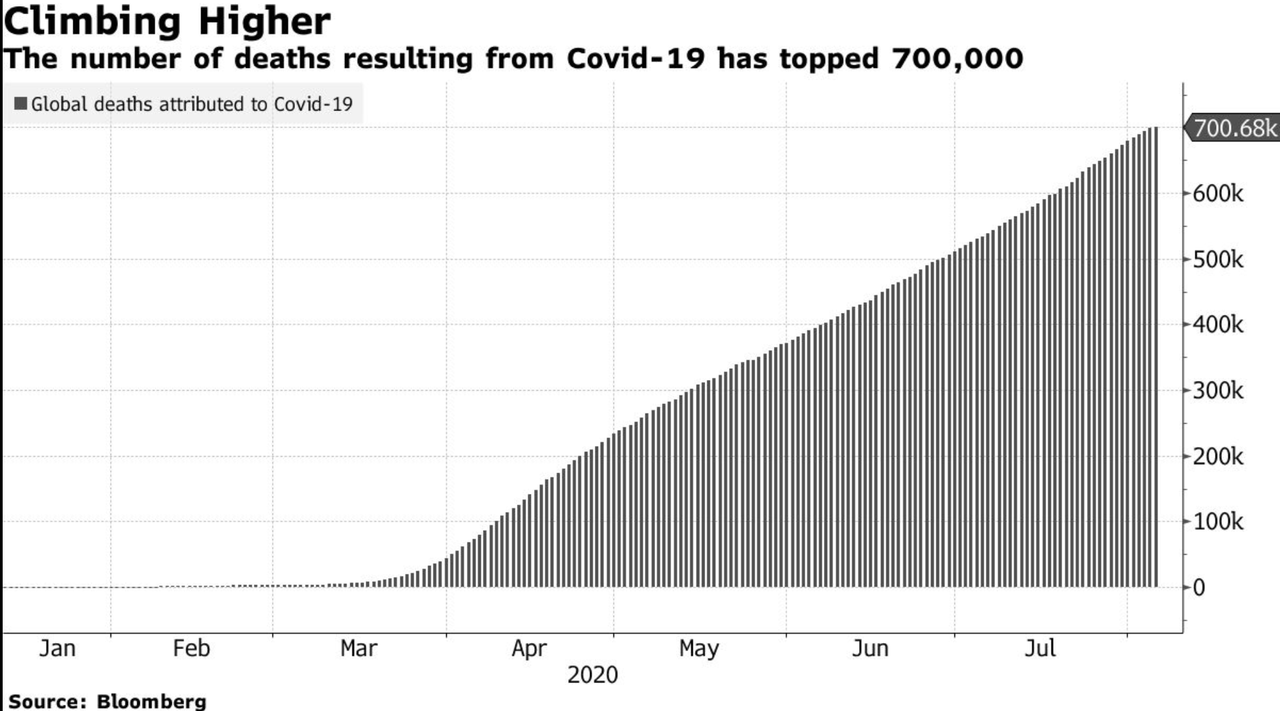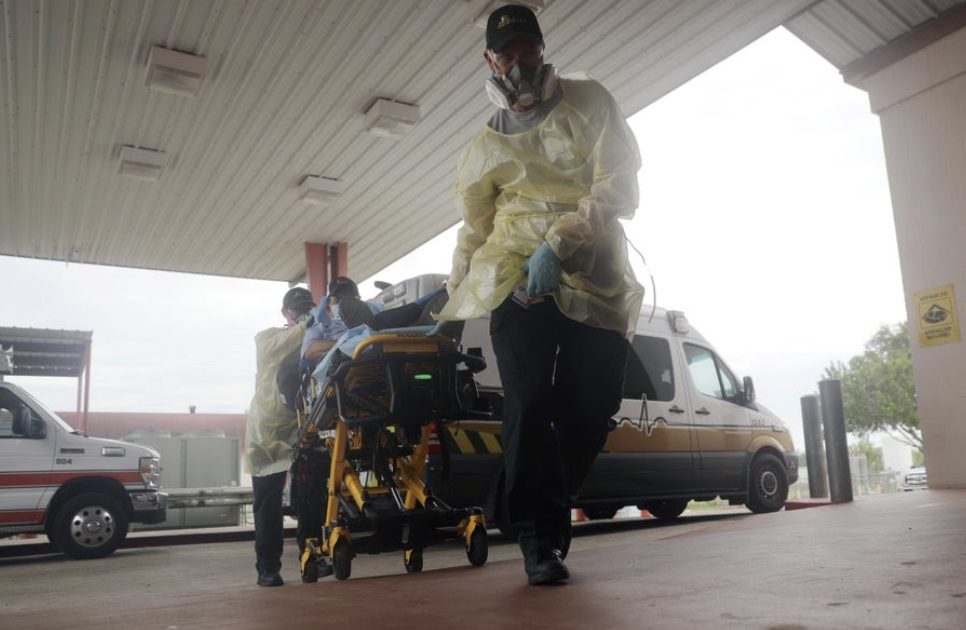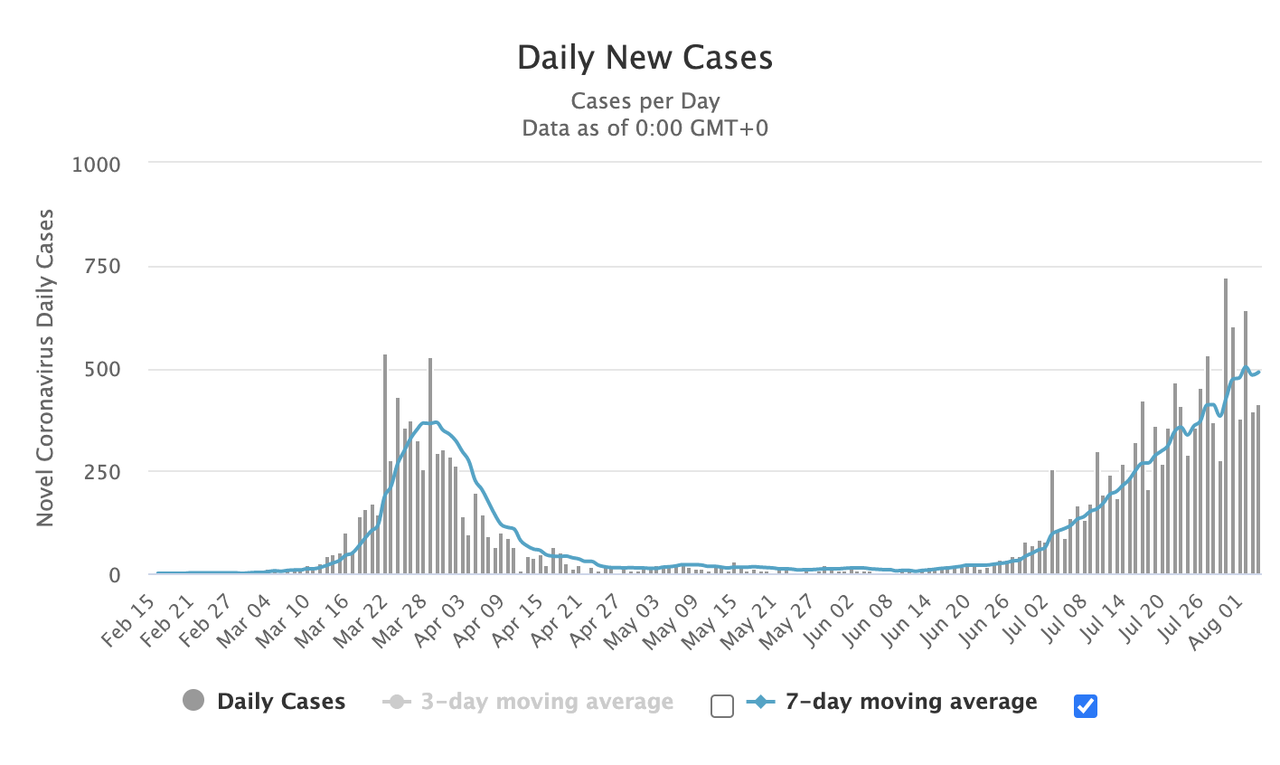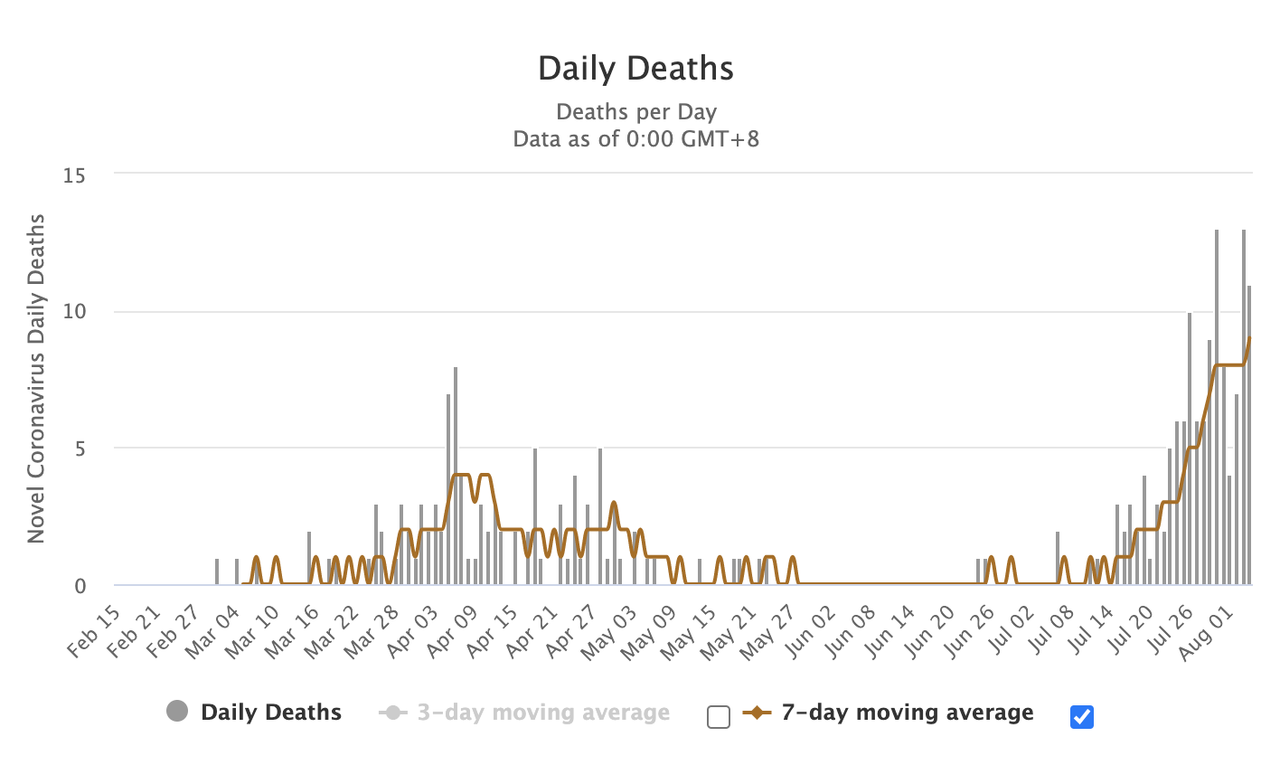Global COVID-19 Deaths Top 700,000, Victoria Suffers Another Record Despite ‘Toughest Lockdown Yet’: Live Updates
Tyler Durden
Wed, 08/05/2020 – 07:48
Summary:
- COVID deaths top 700k
- US to send DHHS Secretary Alex Azar on historic visit to Taiwan
- Czech Republic reports biggest jump in new cases since June
- Poland suffers record deaths
- WHO sends team of 43 to South Africa
- Uganda is Africa’s standout COVID success story
- WHO says first “confirmed” North Korea COVID cases “inconclusive”
- Queensland, Australia bars travelers from all Eastern states
* * *
As new COVID-19 cases continued to slow in the US and Brazil on Tuesday, the number of confirmed deaths worldwide passed the 700,000 mark, while the number of confirmed cases hit, according to data from JHU and Bloomberg.
Perhaps the biggest news overnight comes out of the US, where Health and Human Services Secretary Alex Azar said he plans to visit Taiwan to discuss the international response to the pandemic. The trip will happen in the coming days. It will almost certainly lead to a further deterioration in the relationship between the US and China, as Azar’s visit will be the highest-level visit by an American Cabinet official since the break in formal diplomatic relations between Washington and Taipei in 1979.
The Czech Republic reported its biggest daily jump in cases since the end of June on Wednesday. The 290 new cases pushed its national total to 17,286, with 383 deaths. Roughly 1/4th of the new cases – 77 – were in the eastern region of Moravia-Silesia, bordering Poland, where many miners and their families have been infected. It comes as Poland reported several consecutive days of record case numbers. Poland, meanwhile, reported 18 new virus-linked deaths, the most in a day since June 30, raising the country’s death toll to 1,756
North Korea’s suspected first coronavirus patient – a defector who recently snuck back in to the closed off country – has tested inconclusive for the virus, according to the WHO rep who works with North Korea (a reliable, independent, source of information, we’re sure.
“The person was tested for Covid-19, but test results were inconclusive,” Dr Edwin Salvador, the WHO representative for North Korea, told Reuters on Wednesday.
As many as 64 first contacts and 3,571 secondary contacts of the suspected case have been identified and quarantined in government facilities for a period of 40 days, Salvador said. Kaesong remains under lockdown and household doctors continue to conduct surveillance in the city, he said.
Australia has tightened its lockdown in the troubled state of Victoria to resemble the restrictions that forced hundreds of millions of Europeans to remain indoors for months. While it could take weeks for these measures to have some impact, the state is already nearly 4 weeks in to a ‘partial lockdown’ imposed when the latest cluster in Melbourne first emerged.
The Associated Press described how Australia’s streets “drained of life” this week as the state of Victoria imposed the country’s toughest lockdown yet.
And despite all of this, Victoria premier Daniel Andrews announced 725 new cases in the state and 15 new deaths, making the last 24 hours the deadliest day yet for the Australian outbreak, and the second-worst day for new cases across the country (it was the worst day for Victoria). Though, to be sure, South Australia processed a record number of COVID-19 tests on Tuesday, and are expected to exceed that again today, as thousands flock to testing.
The outbreak in Victoria is creating more paranoia nationally as the state of Queensland on Wednesday announced that it would shut its state border with the rest of Australia’s East Coast, after having already banned travelers from Victoria. Travelers from New South Wales and the Australian Capital Territory won’t be allowed to travel to Queensland starting Aug. 8. This despite the fact that the ACT currently has no active cases.
NSW also announced that all residents returning from Victoria will need to hotel quarantine for 14 days at their own expense.
As WHO plays down the outbreak in North Korea, its Africa arm is sending a team of 43 specialists to South Africa, a country that has quietly climbed the coronavirus rankings as Africa’s most industrialized nation is also home to its largest outbreak – or, to put it more accurately, the continent’s largest number of confirmed infections: As of Wednesday morning, the country had 521,318 cases, the fifth-highest number in the world, and more than half of all reported infections in Africa, which is now close to the 1 million milestone. South Africa’s health minister on Wednesday heralded the country’s decreasing infection rate, but warned that the people must stay vigilant to stave off “a renewed surge”. SA has recorded 8,884 COVID-19 deaths, although studies of excess mortality rates indicate the actual toll could be higher.
Like in India and many other poor countries, the virus spread like wildfire through South Africa’s overcrowded urban slums in Cape Town, Johannesburg and other cities. For weeks, it threatened to overwhelm public hospitals, but Health Minister Zwelini Mkhize told reporters Wednesday that the health care system in the country will be able to cope.
“Our hospitals have been battered but we have not breached our hospital capacity,” he said. “Our wards are full and our ICU beds are full, but not to complete capacity. And the field hospitals that we constructed still have space.” There have been adequate supplies of oxygen for severely affected patients, he said.
After reporting the latest updates from South Africa, Reuters on Wednesday published a lengthy story about Uganda, one of the largest countries in Africa, and how its experience with deadly viruses like Ebola and Marburg shaped its handling of coronavirus. Uganda – a nation of 42 million – has recorded just a handful of deaths due to the restrictive and sometimes brutally enforced lockdown imposed by the authoritarian government.
Despite crumbling public hospitals, doctors’ strikes and corruption scandals, the African nation has largely succeeded in containing the virus: It has recorded just 1,200 cases and five deaths since March. Per Reuters, Uganda’s experience “shows what can be accomplished when a government with a firm grip on power acts quickly and enforces a strict lockdown. But its success came at a cost, critics say.
Jobs were lost, and economic growth is set to plunge to as low as 0.4% in 2020, from 5.6% last year, according to the World Bank.”
Meanwhile, Africa’s 54 countries have recorded a total of roughly 975,000 cases and 21,000 deaths from the virus.
As a result of the lockdown, some pregnant women died in labor, unable to reach hospitals in time due to travel restrictions, while security forcesbeat and arrested some scofflaws who disobeyed the lockdown.
“A jobless person is better than a dead person,” state minister for health Robinah Nabbanja told Reuters. “The lockdown was completely justified.”
Not everyone agreed: “I go hungry sometimes and eat only once in a day,” he said. “Coronavirus hasn’t killed us but the hell of going hungry is not that far from death.”
Moving on to Asia, perhaps the biggest news overnight amounts to a disturbing echo of the initial coronavirus outbreak in Wuhan. Japanese Economy Minister Yasutoshi Nishimura warned on Wednesday that Japan is facing a “second wave”, and that Japanese citizens should exercise caution when traveling for the upcoming Obon Holiday that starts next week. He asked any Japanese with symptoms to please stay home. The holiday – like the Chinese New Year holiday that coincided with the initial phase of the outbreak – typically sees millions of Japanese return to their hometowns to visit family.
![]()
Zero Hedge’s mission is to widen the scope of financial, economic and political information available to the professional investing public, to skeptically examine and, where necessary, attack the flaccid institution that financial journalism has become, to liberate oppressed knowledge, to provide analysis uninhibited by political constraint and to facilitate information’s unending quest for freedom. Visit https://www.zerohedge.com



